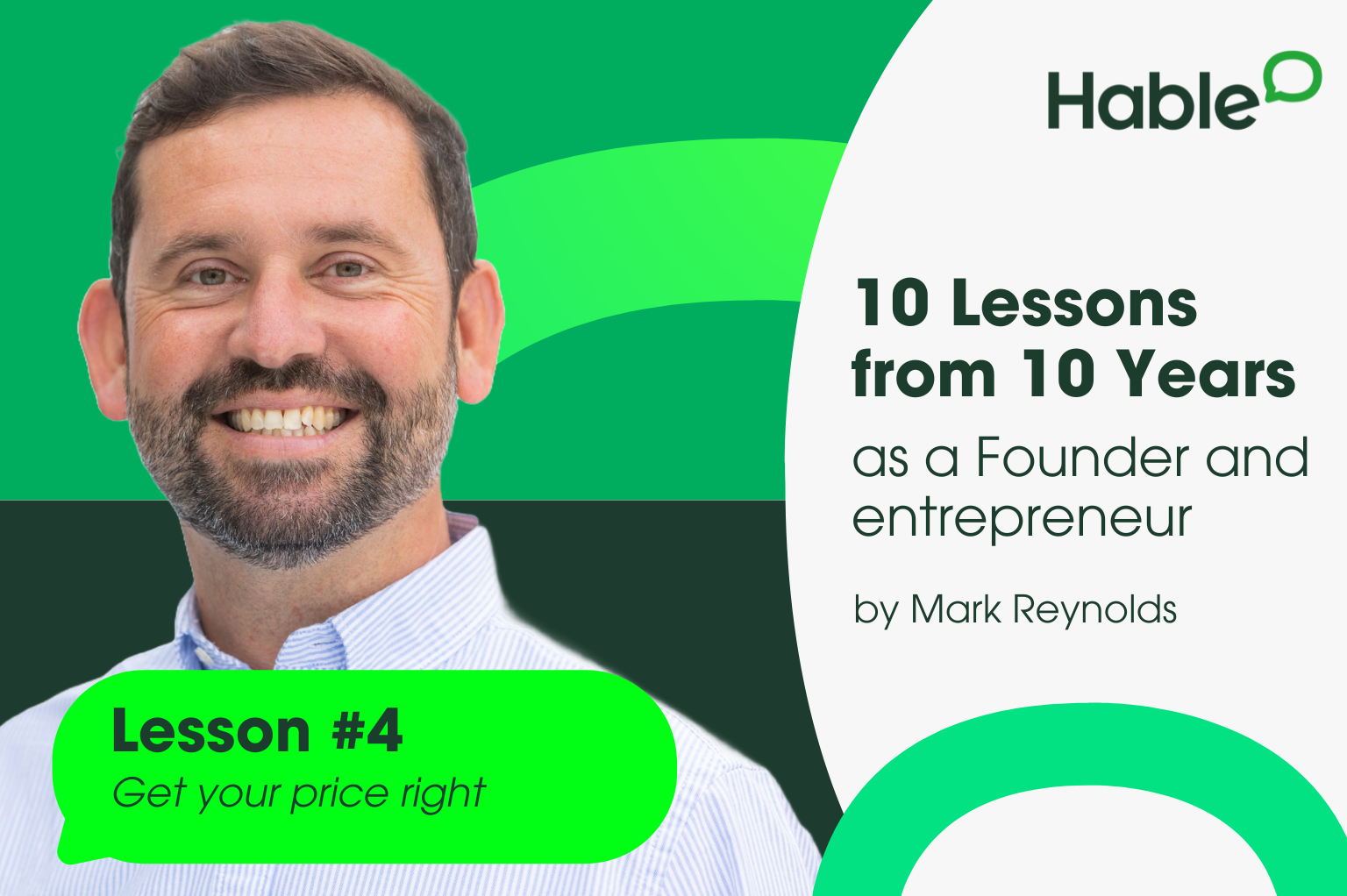
In the early days of Hable, I have to admit, I didn’t get my pricing strategy right. We did most of our work on a day-rate at the start – and coming up with our first rate card was a challenge! It was a time of experimentation and learning, and while it was a necessary phase, it also came with its fair share of challenges.
I remember one customer saying to me “instead of charging me for X-number of days – why don’t you just write down the outcomes I want and tell me how much it will cost to get us there?” That was excellent feedback, but also a tough lesson – and a little embarrassing being told by your customer how to do pricing! But it taught me the importance of having a clear pricing structure – and got me thinking about pricing the job, instead of the time (which in a consulting or Services business, is a constant topic of debate!).
If you do want to work to a daily or hourly rate – whatever industry you are in – then doing your research into what others charge and working out where to pitch yourself is the first step. Whether you want to try and win work by being affordable (or going in with a small piece of work to get your foot in the door) - or want to be “reassuringly expensive” - usually the market will tell you in the first few months whether you’ve nailed it. Too much work to cope with? Probably too cheap. Calls go really well until you talk money? Probably too expensive.
You also need to be really clear on the value you bring. Price and value are two very different things.
Why Pricing Matters
It might seem obvious – your price matters because you need to make money. You probably aren’t starting a business for fun. You’re starting because you have seen an opportunity. If you are working on your own, you should do some basic maths about how much you need to earn in a month, for example. Then you need to work out your fixed costs, or “overheads”. And if you are selling your own time, in order to deliver the work – then you need to work out how much time you’re going to need to do things that are NOT being charged to a customer.
Let's say you need to earn £4000 per month before tax, so £1000 per week. You set your day rate at £500 per day. So 2 days per week of billable work is fine, right? Easy. But what about paying for overheads – your computer, tools, phone, travel, website, insurance, etc? What about holidays, and slow periods during the year? Better make it 4 days a week – just to be safe. Now I’m making more than I need each month – but I have no time for business development; so I might be busy this month – and earn nothing the next! Lots to think about...
(I am only able to talk about my experience here – and I’ve never started a product business. If you want to do that – whether you’re writing an app, or in a development kitchen trying to come up with a world changing food trend – then you’re going to have bigger costs up front and probably be loss making for a while – but the rewards could be bigger.)
Whatever business you are in, accurate pricing also ensures that you cover your costs and make a profit. Get your pricing wrong and you might be working very hard – but not making any money, which is really deflating. In the interest of transparency, Hable has made a profit for 9 years out of the 10 we’ve been in business – which now I look back on and feel pretty good. But in the loss-making year, it was very tough – both on me personally, and on our staff. Profit is essential for the sustainability of your business, and without accurate pricing (and a bunch of other stuff I’ll cover later in this series) you might find yourself struggling to break even.
One of our mistakes over the years, is not being clear enough about what customers DON’T get as part of the price – and only talking about what they DO. Just because a customer has agreed to give you what you see as “a lot of money” - doesn’t mean that you have to give them everything you can do, for that sum. You might need to be very specific on a contract of scope-of-work document, to ensure your customer knows what is and isn’t included. Or this might just be a simple, honest conversation at the start of your relationship.
How to Get Your Pricing Right
Experiment. Gather feedback. Adapt.
I am not a pricing expert, but I know a man who is. I had the privilege of attending a workshop by David Abbott last year – who wrote a book “How to price your platypus”. He talks a lot about the emotion & “irrational” behaviour that humans can exhibit when buying something – but he also talks a lot about the science behind it. And he’s big on pricing experiments.
While having a set pricing structure is important, it's also essential to remain open to testing and trying different pricing strategies. Don't be afraid to change your pricing and adapt to market forces. Keep an open mind and see what works best for you and your business. Also don’t be afraid to ask your customers or people within your target market for feedback on your pricing; it can provide some really valuable insight. In 2014 I did just this – and told one someone (who became our first customer) what my day rate was going to be. He said, “it’s a bit higher than I was expecting, but I know you’re good – so we have a deal”. If I was miles out, I am sure he would have told me that, too...
While it may take some time and effort to develop a clear pricing structure, the benefits are well worth it. So, take the time to plan your approach to pricing, make any necessary adjustments as you go, and don't be afraid to ask for feedback. Your business will be stronger if the price right.

